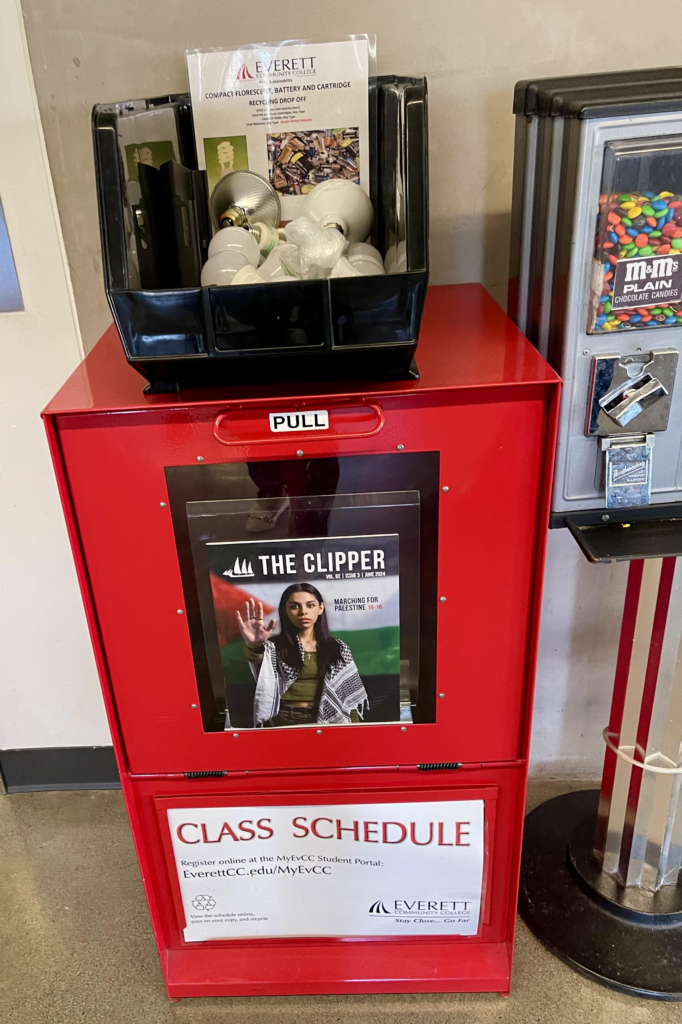
Bring your used batteries, printer and toner cartridges and compact fluorescent lights to one of the following locations across campus:
- Liberty Hall (LBH): 1st floor next to the North entrance doors, across from the Fitness Center.
- Gray Wolf Hall (GWH): 1st and 2nd floors next to the bathrooms.
- Glacier Hall (GLA): 1st floor Reception 101 next to the door.
- Shuksan Hall (SHK): Main Entrance on top of the EvCC clipper box on the right.
- Parks Student Union (PSU): 2nd floor next to the ATM near the bookstore.
- Whitehorse Hall (WHI): Next to the staircase by the Main Entrance.
- Olympus Hall (OLY): 2nd floor hallway next to copier.
Please make sure it’s free from plastic bags, ziplock or cardboard boxes.
Batteries are manufactured using different mixtures of chemical elements designed to meet customers’ power and performance needs. Batteries can contain metals such as mercury, lead, cadmium, nickel and silver, which can pose a threat to human health or the environment when improperly managed at the end of their service life.
Once a battery is no longer useful, the type and chemistry of the battery determines which of the various waste management options to use. It is important to manage batteries correctly according to their type because some batteries can cause a risk to safety and health if mismanaged at the end of their lives. Batteries can have enough energy to injure or start fires even when used and when they appear to be discharged. For safety, remember that not all batteries are removable or serviceable by the user—heed battery and product markings regarding safety and use for all types of batteries.
Battery types are identified by marking and labeling, not by the battery’s shape or the color of the label.
Some batteries may also contain materials such as cobalt, lithium and graphite that are considered critical minerals by the United States Geological Survey.
Certain batteries should NOT go in household garbage or recycling bins. This page can inform you on how to manage these batteries safely. Waste batteries can always be recycledExit EPA’s website or taken to household hazardous waste collection pointsExit EPA’s website.
To prevent fires from lithium-ion batteries, tape battery terminals and/or place batteries in separate plastic bags and never put these batteries in household garbage or recycling bins.
To Find information about the types of batteries used in households and how to manage them when they are no longer needed click here:
https://www.epa.gov/recycle/used-household-batteries
To Find a Recycling Location Near You click here:
Call2RecycleExit EPA’s website
Styrofoam Recycling Event!
Wednesday, Oct. 16, 2024
Parking Lot F 10am-2pm
EvCC Students for Enviromental Action (SEA) Club and Sustainability Department invites you to be an environmental hero! Bring clean styrofoam, packing peanuts in bags or boxes, bubble wrap and plastic film to be recycled–for FREE! If you are bringing styrofoam, please consider bringing a donation for the Marysville Food Bank of non-perishable food or monetary donations. We hope to collect as much styrofoam as possible; help us spread the word to your family, neighbors, and friends.
See a list of acceptable items.https://www.everettcc.edu/calendar/2022/04/styrofoam-recycling-event
Learn more about EvCC Sustainability www.everettcc.edu/green
| ReplyForward |
